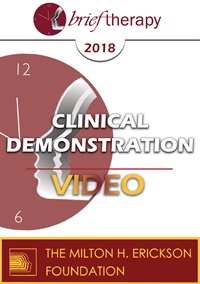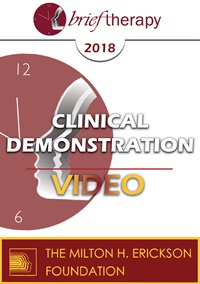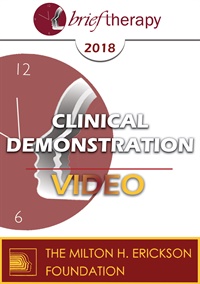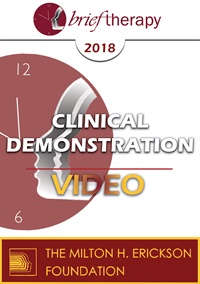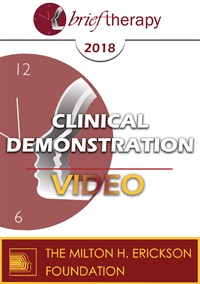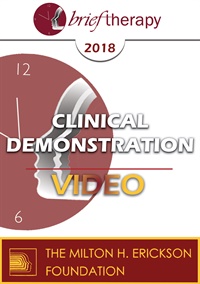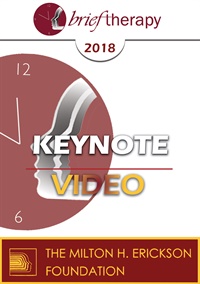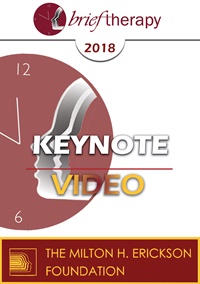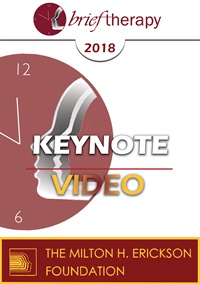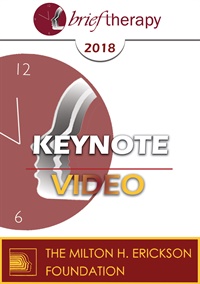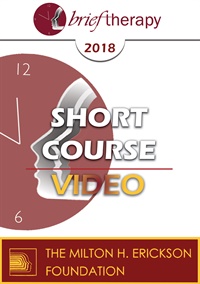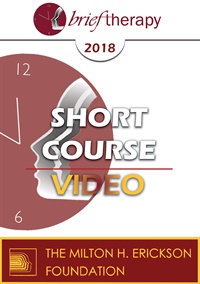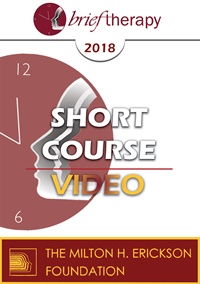Credit available - Click Here for more information
- Average Rating:
- Not yet rated
- Topic Areas:
- Clinical Demonstrations | Anxiety | Hypnosis | Brief Therapy | Language of Hypnosis
- Bundle(s):
- Learning Track - Using Hypnosis
- Categories:
- Brief Therapy Conference | Brief Therapy Conference 2018 | Online Continuing Education
- Faculty:
- Lynn Lyons, LICSW
- Course Levels:
- Master Degree or Higher in Health-Related Field
- Duration:
- 58:59
- Format:
- Audio and Video
- Original Program Date:
- Dec 08, 2018
- Short Description:
- Using hypnosis to help anxious people relax and feel calm is a great start, but hypnosis offers other valuable opportunities to disrupt the patterns of anxiety, create a different relationship to thoughts and physical symptoms , and to shift the client from avoidance into action.
- Price:
-
Sale is $29.00
price reduced from Base Price - $59.00
- Average Rating:
- Not yet rated
- Topic Areas:
- Clinical Demonstrations | Brief Therapy | Solution Oriented Approach | Therapist Development
- Categories:
- Brief Therapy Conference | Brief Therapy Conference 2018
- Faculty:
- Elliott Connie, MA, LPC
- Course Levels:
- Master Degree or Higher in Health-Related Field
- Duration:
- 1:02:21
- Format:
- Audio and Video
- Original Program Date:
- Dec 08, 2018
- Short Description:
- This event will feature a live demonstration of the Solution Focused Approach in action. Attendees will be able to ask question to the presenter about this session.
- Price:
-
Sale is $29.00
price reduced from Base Price - $59.00
Credit available - Click Here for more information
- Average Rating:
- Not yet rated
- Topic Areas:
- Clinical Demonstrations | Belief Systems | Brief Therapy | Resources
- Categories:
- Brief Therapy Conference | Brief Therapy Conference 2018 | Online Continuing Education
- Faculty:
- Robert Dilts, BA
- Course Levels:
- Master Degree or Higher in Health-Related Field
- Duration:
- 1:00:44
- Format:
- Audio and Video
- Original Program Date:
- Dec 08, 2018
- Short Description:
- "Belief barriers" are beliefs or assumptions that interfere with or undermine our motivation and progress toward the successful achievement of our goals. Many such barriers will emerge for clients during brief therapy. Therapists need to have the skill to create “belief bridges” that get over or bypass limiting beliefs and belief barriers, and ultimately create the possibility to transform them. This demonstration will show how to identify a belief barrier and help create a "belief bridge" that reconnects the client to key resources and shifts their focus to a broader perspective.
- Price:
-
Sale is $29.00
price reduced from Base Price - $59.00
Credit available - Click Here for more information
- Average Rating:
- Not yet rated
- Topic Areas:
- Clinical Demonstrations | Hypnosis | Resources | Experiential Therapy | Suggestion | Brief Therapy
- Categories:
- Brief Therapy Conference | Brief Therapy Conference 2018 | Online Continuing Education
- Faculty:
- Michael Yapko, PhD
- Course Levels:
- Master Degree or Higher in Health-Related Field
- Duration:
- 57:31
- Format:
- Audio and Video
- Original Program Date:
- Dec 08, 2018
- Short Description:
- In this demonstration, hypnosis helps a volunteer struggling with stage fright move from self-doubt to grounded confidence. Through imagery, metaphor, and gentle reframing, the process highlights how shifting focus from fear of judgment to the power of one’s message can unlock presence and ease. Participants witness how hypnosis draws on personal resources and past strengths to dissolve performance anxiety and foster resilience.
- Price:
-
Sale is $29.00
price reduced from Base Price - $59.00
Credit available - Click Here for more information
- Average Rating:
- Not yet rated
- Topic Areas:
- Clinical Demonstrations | Obsessive Compulsive Disorder (OCD) | Brief Therapy
- Categories:
- Brief Therapy Conference | Brief Therapy Conference 2018 | Online Continuing Education
- Faculty:
- Reid Wilson, PhD
- Course Levels:
- Master Degree or Higher in Health-Related Field
- Duration:
- 1:00:23
- Format:
- Audio and Video
- Original Program Date:
- Dec 08, 2018
- Short Description:
- In this live demonstration, Reid Wilson works with a participant facing OCD rooted in relationships and morality. Emphasizing process over content, Wilson introduces a bold two-week experiment—donating to an opposing political party as a consequence for engaging obsessions. The session highlights detachment, strategic disruption, and mindfulness as tools for reducing the power of intrusive thoughts.
- Price:
-
Sale is $29.00
price reduced from Base Price - $59.00
Credit available - Click Here for more information
- Average Rating:
- Not yet rated
- Topic Areas:
- Clinical Demonstrations | Brief Therapy | Trauma | Future Oriented | Post-Traumatic Stress Disorder (PTSD)
- Bundle(s):
- Learning Track - Turn Down the Trauma
- Categories:
- Brief Therapy Conference | Brief Therapy Conference 2018
- Faculty:
- Bill O'Hanlon, MS
- Course Levels:
- Master Degree or Higher in Health-Related Field
- Duration:
- 1:06:05
- Format:
- Audio and Video
- Original Program Date:
- Dec 08, 2018
- Short Description:
- This live demonstration will illustrate how to briefly connect with a client who has been suffering from some aftereffect from trauma and to help the client resolve some of that post-traumatic suffering.
- Price:
-
Sale is $29.00
price reduced from Base Price - $59.00
Credit available - Click Here for more information
- Average Rating:
- Not yet rated
- Topic Areas:
- Clinical Demonstrations | Mindfulness | Psychotherapy | Brief Therapy
- Bundle(s):
- Learning Track - Mindfulness
- Categories:
- Brief Therapy Conference | Brief Therapy Conference 2018 | Online Continuing Education
- Faculty:
- Ronald Siegel, PsyD
- Course Levels:
- Master Degree or Higher in Health-Related Field
- Duration:
- 1:02:29
- Format:
- Audio and Video
- Original Program Date:
- Dec 08, 2018
- Short Description:
- Clinicians are enthusiastically discovering that mindfulness practices can enlighten and enliven their lives, both inside and outside the therapy hour. These techniques hold great promise for personal development and as a powerful method to enhance virtually all forms of psychotherapy. But what does mindfulness-informed therapy actually look like? This demonstration, using volunteers from the audience, will illustrate how mindfulness practices and insights derived from them can inform treatment.
- Price:
-
Sale is $29.00
price reduced from Base Price - $59.00
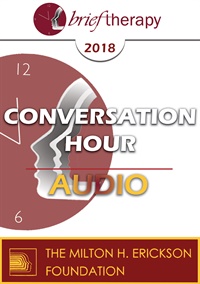
- Average Rating:
- Not yet rated
- Topic Areas:
- Great Conversations | Anxiety | Brief Therapy
- Categories:
- Brief Therapy Conference | Brief Therapy Conference 2018
- Faculty:
- Bill O'Hanlon, MS | Reid Wilson, PhD
- Duration:
- 1:01:40
- Format:
- Audio Only
- Original Program Date:
- Dec 08, 2018
- Short Description:
- Bill O’Hanlon and Reid Wilson share a fast-paced, results-driven approach to treating anxiety with brief therapy. Emphasizing immediate action, strong rapport, and personalized strategies, they challenge traditional models in favor of cognitive experiments and strategic disruptions. Techniques include articulatory suppression, external focus, and reframing anxiety to break unhelpful patterns. The session also explores big-picture thinking and the role of conflict resolution in lasting change.
- Price:
- $15.00 - Base Price
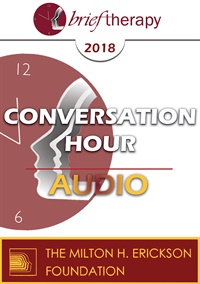
- Average Rating:
- Not yet rated
- Topic Areas:
- Great Conversations | Children and Adolescent Therapy | Family Therapy | Trauma | Brief Therapy | Post-Traumatic Stress Disorder (PTSD)
- Categories:
- Brief Therapy Conference | Brief Therapy Conference 2018
- Faculty:
- Camillo Loriedo, MD, PhD | Lynn Lyons, LICSW
- Duration:
- 1:00:58
- Format:
- Audio Only
- Original Program Date:
- Dec 08, 2018
- Short Description:
- Trauma does not only affect individuals; it effects families. Systemic perspectives on the sequel to trauma will be presented.
- Price:
- $15.00 - Base Price
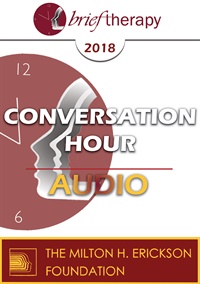
- Average Rating:
- Not yet rated
- Topic Areas:
- Great Conversations | Phobia | Brief Therapy
- Categories:
- Brief Therapy Conference | Brief Therapy Conference 2018
- Faculty:
- Robert Dilts, BA | Jeffrey Zeig, PhD
- Duration:
- 59:18
- Format:
- Audio Only
- Original Program Date:
- Dec 08, 2018
- Short Description:
- Technical and theoretical approaches to working with phobias will be described from complementary perspectives.
- Price:
- $15.00 - Base Price
Tags: Brief Therapy Phobias
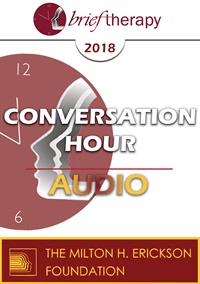
- Average Rating:
- Not yet rated
- Topic Areas:
- Great Conversations | Hypnosis | Mindfulness | Brief Therapy
- Categories:
- Brief Therapy Conference | Brief Therapy Conference 2018
- Faculty:
- Ronald Siegel, PsyD | Michael Yapko, PhD
- Duration:
- 1:00:08
- Format:
- Audio Only
- Original Program Date:
- Dec 08, 2018
- Short Description:
- This wide-ranging dialogue explores the intersections of mindfulness and hypnosis, weaving together clinical stories, research, and experiential insights. From transforming pain perception in brain imaging studies to reshaping rigid self-definitions in therapy, the conversation shows how each practice offers unique yet overlapping ways of fostering flexibility and resilience. Participants hear vivid examples of how language, suggestion, and attention shape identity, affect tolerance, and the capacity for change.
- Price:
- $15.00 - Base Price
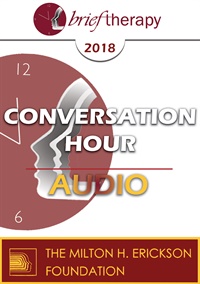
- Average Rating:
- Not yet rated
- Topic Areas:
- Great Conversations | Anxiety | Depression | Research | Training | Brief Therapy
- Categories:
- Brief Therapy Conference | Brief Therapy Conference 2018
- Faculty:
- Stephen Gilligan, PhD | Scott Miller, PhD
- Duration:
- 1:05:12
- Format:
- Audio Only
- Original Program Date:
- Dec 08, 2018
- Short Description:
- Therapists need theoretical and technical constructs, including those that are empirically based. Therapists need to understand how to create a comprehensive treatment plan.
- Price:
- $15.00 - Base Price
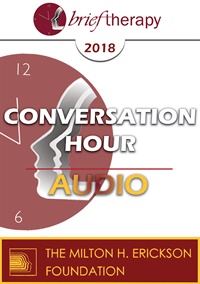
- Average Rating:
- Not yet rated
- Topic Areas:
- Great Conversations | Multicultural | Brief Therapy | Treatment Planning
- Categories:
- Brief Therapy Conference | Brief Therapy Conference 2018
- Faculty:
- Laura Brown, PhD | Elliott Connie, MA, LPC
- Duration:
- 1:05:53
- Format:
- Audio Only
- Original Program Date:
- Dec 08, 2018
- Short Description:
- Contemporary therapist need to understand culturally competent practice. Principles of assessment and treatment will be offered.
- Price:
- $15.00 - Base Price
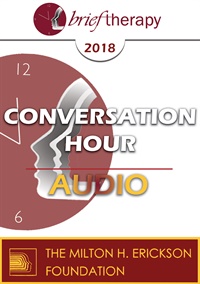
- Average Rating:
- Not yet rated
- Topic Areas:
- Great Conversations | Habits | Brief Therapy | Treatment Planning
- Categories:
- Brief Therapy Conference | Brief Therapy Conference 2018
- Faculty:
- David Burns, MD | Jeffrey Zeig, PhD
- Duration:
- 56:53
- Format:
- Audio Only
- Original Program Date:
- Dec 08, 2018
- Short Description:
- The mechanics of assessment and treatment planning for working with habits and addictions including relevant research findings.
- Price:
- $15.00 - Base Price
Credit available - Click Here for more information
- Average Rating:
- Not yet rated
- Topic Areas:
- Keynotes | Multicultural | Psychotherapy | Brief Therapy | Training
- Categories:
- Brief Therapy Conference | Brief Therapy Conference 2018 | Online Continuing Education
- Faculty:
- Patricia Arredondo, EdD
- Course Levels:
- Master Degree or Higher in Health-Related Field
- Duration:
- 1:03:49
- Format:
- Audio and Video
- Original Program Date:
- Dec 05, 2018
- Short Description:
- This session looks closely at how Latinx immigrants and their families endure, adapt, and keep moving forward in the face of political pressure, cultural disruption, and uncertainty. Drawing on lived stories, social context, and clinical perspective, it explores acculturation stress, family dynamics, identity, and resilience anchored in values like family, faith, and pride. The talk offers therapists and students a grounded way to understand immigrant experience and bring greater sensitivity and perspective into their clinical work.
- Price:
-
Sale is $29.00
price reduced from Base Price - $59.00
Credit available - Click Here for more information
- Average Rating:
- Not yet rated
- Topic Areas:
- Keynotes | Trauma | Brief Therapy | Meditation, Spirituality and Yoga | Post-Traumatic Stress Disorder (PTSD) | Music
- Bundle(s):
- Learning Track - Turn Down the Trauma
- Categories:
- Brief Therapy Conference | Brief Therapy Conference 2018 | Online Continuing Education
- Faculty:
- Bessel van der Kolk, MD
- Course Levels:
- Master Degree or Higher in Health-Related Field
- Duration:
- 1:06:32
- Format:
- Audio and Video
- Original Program Date:
- Dec 06, 2018
- Short Description:
- This workshop will show how trauma affects the developing mind and brain, and teach how trauma affects self-awareness and self-regulation. We will focus on the fundamental difference between trauma desensitization vs. integration and growth, and look at the difference between disrupted attachment and traumatic stress. We will examine the role of interpersonal rhythms and attunement in establishing a sense of self and community. This workshop will discuss and demonstrate affect regulation techniques, examine ways to deal with fragmented self-experience, and teach the benefits of yoga, EMDR, meditation, neurofeedback, music and theater.
- Price:
-
Sale is $29.00
price reduced from Base Price - $59.00
Credit available - Click Here for more information
- Average Rating:
- Not yet rated
- Topic Areas:
- Keynotes | Brief Therapy | Psychology | Psychotherapy
- Categories:
- Brief Therapy Conference | Brief Therapy Conference 2018 | Online Continuing Education
- Faculty:
- Frank Sulloway, PhD
- Course Levels:
- Master Degree or Higher in Health-Related Field
- Duration:
- 1:03:02
- Format:
- Audio and Video
- Original Program Date:
- Dec 07, 2018
- Short Description:
- BT18 Keynote 03 - Birth Order and Human Behavior: Understanding an Elusive Relationship - Frank J. Sulloway For more than half a century, studies of birth order and human behavior have been mired in disagreement over the existence, magnitude, and specific nature of this relationship. In this talk I argue that much of the previous research in this field has been substantially impeded because birth order is an imperfect proxy for multiple within-family influences that shape personality development within families, but that are overlooked in most studies. Much of the previous disagreements in this field can also be can be attributed to other methodological problems, including a failure to consider individual differences and their sometimes complex interactions with birth order, as well as the role of the behavioral context. This talk presents the results of a novel research design aimed at overcoming these problems and involving 438,251 responses collected using Internet surveys.
- Price:
-
Sale is $29.00
price reduced from Base Price - $59.00
Credit available - Click Here for more information
- Average Rating:
- Not yet rated
- Topic Areas:
- Keynotes | Anxiety | Brief Therapy | Cognitive Behavior Therapy (CBT) | Depression
- Categories:
- Brief Therapy Conference | Brief Therapy Conference 2018 | Online Continuing Education
- Faculty:
- David Burns, MD
- Course Levels:
- Master Degree or Higher in Health-Related Field
- Duration:
- 1:00:36
- Format:
- Audio and Video
- Original Program Date:
- Dec 09, 2018
- Short Description:
- Dr. Burns will describe powerful new TEAM-CBT techniques that can greatly accelerate recovery from depression and anxiety disorders. He will bring these tools with life with dramatic video excerpts from a therapy session with a mental health professional who had been struggling with years of intense anxiety, depression, and guilt.
- Price:
-
Sale is $29.00
price reduced from Base Price - $59.00
Credit available - Click Here for more information
- Average Rating:
- Not yet rated
- Topic Areas:
- Short Courses | Brief Therapy | Trauma | Ericksonian Hypnosis and Therapy Techniques | Mindfulness | Pain and Healing | Somatic Experiences
- Categories:
- Brief Therapy Conference | Brief Therapy Conference 2018 | Online Continuing Education
- Faculty:
- Ronald Alexander, PhD
- Course Levels:
- Master Degree or Higher in Health-Related Field
- Duration:
- 1:31:13
- Format:
- Audio and Video
- Original Program Date:
- Dec 06, 2018
- Short Description:
- This course focuses on helping clients regain momentum after overwhelming experiences by using brief, body-centered interventions. Participants explore how curiosity, movement, and simple awareness practices can loosen rigid trauma responses and reopen access to choice. With an emphasis on resilience-building, the session offers straightforward tools for shifting clients out of collapse and back into a sense of possibility.
- Price:
-
Sale is $29.00
price reduced from Base Price - $59.00
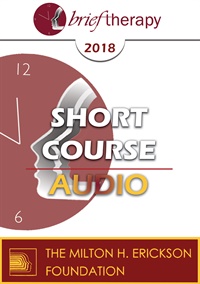
- Average Rating:
- Not yet rated
- Topic Areas:
- Short Courses | Addiction | Brief Therapy | Rational Emotive Behavior Therapy (REBT) | Solution Oriented Approach
- Categories:
- Brief Therapy Conference | Brief Therapy Conference 2018
- Faculty:
- JULIA ALPEROVICH, MS
- Duration:
- 1:25:51
- Format:
- Audio Only
- Original Program Date:
- Dec 06, 2018
- Short Description:
- This presentation will introduce a short-term model of treatment incorporating solution-focused, rational emotive behavioral, and systems theory interventions for residential or intensive outpatient drug and alcohol treatment.
- Price:
- $15.00 - Base Price
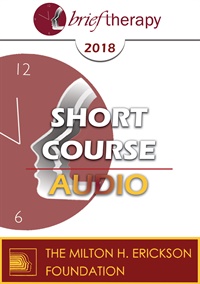
- Average Rating:
- Not yet rated
- Topic Areas:
- Short Courses | Brief Therapy | Therapist Development
- Categories:
- Brief Therapy Conference | Brief Therapy Conference 2018
- Faculty:
- Flavio Cannistra'
- Duration:
- 1:07:49
- Format:
- Audio Only
- Original Program Date:
- Dec 06, 2018
- Short Description:
- Hundreds of brief therapy techniques exist. In this presentation, I will identify the 9 underlying logics, together with methodology and examples.
- Price:
- $15.00 - Base Price
- Average Rating:
- Not yet rated
- Topic Areas:
- Short Courses | Hypnotherapy | Somatic Experiences | Trauma | Children and Adolescent Therapy | Brief Therapy
- Categories:
- Brief Therapy Conference | Brief Therapy Conference 2018
- Faculty:
- Tobi Goldfus, LCSW
- Course Levels:
- Master Degree or Higher in Health-Related Field
- Duration:
- 1:09:59
- Format:
- Audio and Video
- Original Program Date:
- Dec 06, 2018
- Short Description:
- This workshop will examine the perimeters of cyber trust and cyber sincerity and offer assessment tools such as the Social Media Assessment Form and the Self-Report of Social Media Traumatic Experience Form to move into more informed, attuned and effective positions of intervention.
- Price:
-
Sale is $29.00
price reduced from Base Price - $59.00
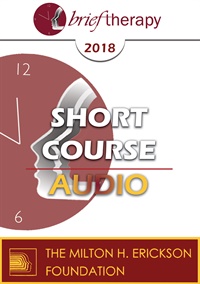
- Average Rating:
- Not yet rated
- Topic Areas:
- Short Courses | Depression | Eating Disorders | Brief Therapy | Hypnotherapy | Weight Loss
- Categories:
- Brief Therapy Conference | Brief Therapy Conference 2018
- Faculty:
- Margot Gotte-El Fartoukh, Dr. phil
- Duration:
- 1:26:23
- Format:
- Audio Only
- Original Program Date:
- Dec 06, 2018
- Short Description:
- The control of body weight is largely remote instinctively. When conscious efforts go nowhere, hypnotherapeutic strategies can open new possibilities. Presented is a model of hypnotherapeutic strategies of weight regulation introduced on the M.E.G. Congress 2018 in Bad Kissingen (Germany).
- Price:
- $15.00 - Base Price
Credit available - Click Here for more information
- Average Rating:
- Not yet rated
- Topic Areas:
- Short Courses | Brief Therapy | Belief Systems | Pain and Healing
- Categories:
- Brief Therapy Conference | Brief Therapy Conference 2018 | Online Continuing Education
- Faculty:
- Timothy Hallbom, MSW | Kris Hallbom, BA
- Course Levels:
- Master Degree or Higher in Health-Related Field
- Duration:
- 1:17:03
- Format:
- Audio and Video
- Original Program Date:
- Dec 06, 2018
- Short Description:
- Dynamic Spin Release™ is a powerful set of processes that allows users to quickly release their negative thought patterns and emotions, limiting beliefs and physical pain – in just one brief session.
- Price:
-
Sale is $29.00
price reduced from Base Price - $59.00
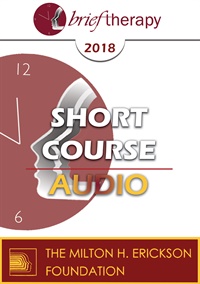
- Average Rating:
- Not yet rated
- Topic Areas:
- Short Courses | Brief Therapy | Psychotherapy
- Categories:
- Brief Therapy Conference | Brief Therapy Conference 2018
- Faculty:
- Melanie McGhee, LCSW
- Duration:
- 1:28:08
- Format:
- Audio Only
- Original Program Date:
- Dec 06, 2018
- Short Description:
- After a brief exploration of the six principles of Acceptance and Integration Training, participants will learn a simple method for helping clients recognize distorted thoughts AS distorted.
- Price:
- $15.00 - Base Price
Tags: Brief Therapy Psychotherapy


